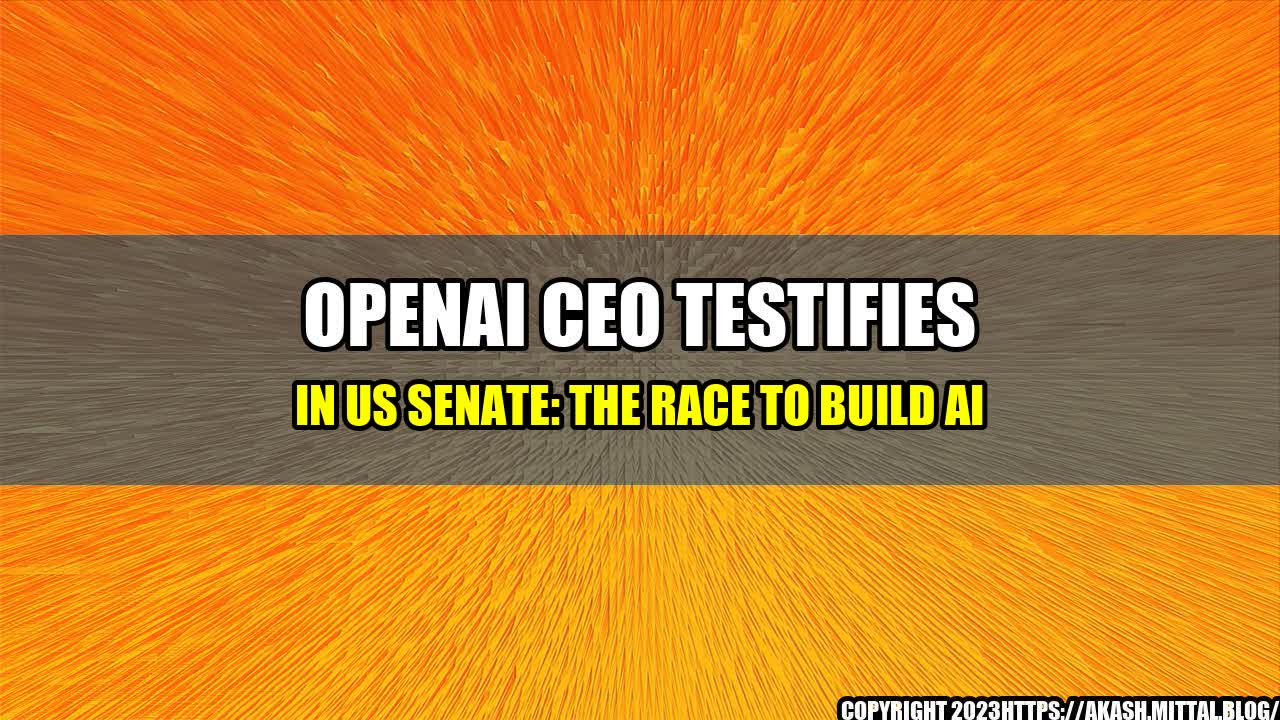It was just another normal day in the office for Sam Altman, the CEO of OpenAI, until he received an unexpected phone call from the US Senate. They asked him to testify in front of the lawmakers and share his insights on one of the most hotly debated and controversial topics of our time: the race to build artificial intelligence.
Altman was nervous. He knew that what he said could have a profound impact on the future of humanity. He took a deep breath, gathered his thoughts, and began his testimony.
"Artificial intelligence is the most important development in our lifetime," he said. "It has the potential to transform every aspect of our lives, from the way we work, to the way we communicate, to the way we think about ourselves."
Altman's testimony was a wake-up call for the lawmakers, who until that point had been largely silent about the AI revolution. He told them that the race to build AI was not just a matter of technological prowess, but a race for power and influence.
The Race to Build AI: A Competition for Power and Influence
Altman explained that there were two major players in the race to build AI: China and the United States. Both countries were investing billions of dollars into AI research and development, hoping to establish dominance in this emerging field. Altman warned that the country that wins the AI race will not only gain economic and military advantages, but also the ability to shape the future of humanity.
Altman's warning was not unfounded. In fact, the race for AI dominance is already underway, and the stakes are high. China has already launched a plan to become the world leader in AI by 2030, while the United States has recently announced a $1 billion investment in AI research. Both countries are fiercely competing for talent, patents, and funding in this rapidly evolving field.
But the race to build AI is not just about economic and military power. It is also about the way we live our lives in the future. Altman explained that AI could have a transformative effect on healthcare, education, transportation, and even our personal relationships. The country that wins the AI race will not only reap the economic benefits, but also shape the way that humanity lives and works for generations to come.
The Dangers of AI: A Threat to Humanity or a Tool for Progress?
Despite the potential benefits of AI, Altman also warned about its dangers. He explained that AI could be used as a tool for oppression, surveillance, and censorship. He also warned about the existential threat posed by superintelligent AI, which could potentially outsmart and even destroy human beings.
Altman's concerns are not unfounded. AI has already been used as a tool for social control and propaganda in China, where the government is using facial recognition and other technologies to monitor and control its citizens. In the United States, AI has been used to perpetuate bias and discrimination, as algorithms are trained on biased datasets and perpetuate systemic inequalities.
Altman argued that the key to harnessing the potential of AI while mitigating its risks was to ensure that the development of AI was transparent, accountable, and aligned with human values.
The Future of AI: What Can We Do?
Altman's testimony was a sobering reminder of the power and potential of artificial intelligence. But it was also a call to action. He urged the lawmakers and the public to engage in a national conversation about the future of AI, and to work together to ensure that AI was developed in a way that aligned with our values and aspirations as a society.
Altman's testimony also provided some practical tips for those involved in AI research and development. He emphasized the importance of diversity and inclusivity in the AI industry, and the need to address issues of bias and discrimination in AI algorithms. He also called for greater transparency and accountability in the way that AI was developed and deployed.
Conclusion
In conclusion, Sam Altman's testimony in the US Senate was a wake-up call for the lawmakers and the public about the race to build AI. It highlighted the potential benefits and dangers of AI, and underscored the importance of ensuring that AI was developed in a way that aligned with human values and aspirations.
Altman's testimony also offered some practical tips for those involved in AI development, and called for greater transparency, accountability, and inclusivity in the industry.
The AI revolution is upon us. It is time for us to take action to shape its course and ensure that it serves the greater good of humanity.

Curated by Team Akash.Mittal.Blog
Share on Twitter Share on LinkedIn